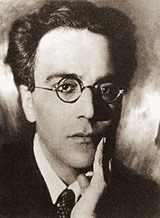Translating Adrik
As a test run for our future RusTrans study of publishing contemporary Russian-English prose translation, I will record here my own efforts to publish my next translation project, The Life of Adrik Melissino. This is a relatively little-known, semi-autobiographical novel by the noted Russian poet and translator, Georgii Arkad’evich Shengeli (1894-1956).  Shengeli is fondly remembered not only as the outstanding Russian translator of Byron, but as a gifted poet and generous friend who mentored other Russian writers and literary translators. Even after his death, Shengeli continued to help others’ careers: Sigizmund Krzhizhanovskii, another unduly obscure Russian 20th-century writer and now available to Anglophone readers through NYRB Classics, was rediscovered largely thanks to a brief, regretful reference to his death in his friend Shengeli’s diary. You can find a brief introduction to Shengeli here by poet and translator Boris Dralyuk, as well as Boris’s translation of one of his poems. In 2018, A.V. Marinine published The Black Epaulette, the first ever anthology of Shengeli’s prose, including a short autobiographical essay, a baker’s dozen of short stories, and two short novels, including The Life of Adrik Melissino, which are the only extant fragments of a planned seven-part autobiographical cycle. Most of this material has never been published. Adrik, set in the historic Crimean town of Kerch in the year 1905, is told from the perspective of a young boy who arrives there with his mother to rebuild their lives after his father rejects them. “Adrik” is a Russian pet name for Adrian. Adrik’s mother battles the shame of unmarried parenthood while working as a teacher in a girls’ school and as a private tutor; Adrik finds new friends and studies hard to excel at his own school. Yet Adrik’s life, as he slowly realizes, is overshadowed not only by poverty but by the stigma of illegitimacy. Meanwhile, daily life is complicated by the social and political issues culminating in the 1905 Revolution: anti-Jewish pogroms, the radicalization of political dissent, the political marginalization of the poor. Written in 1954 not long before Shengeli’s death, Adrik is a rich codex to the author’s legacy: peeping through the keyhole of 1905, like the book’s child-hero struggling to understand the adult world around him, we glimpse colourful fragments of the tragic century to come.
Shengeli is fondly remembered not only as the outstanding Russian translator of Byron, but as a gifted poet and generous friend who mentored other Russian writers and literary translators. Even after his death, Shengeli continued to help others’ careers: Sigizmund Krzhizhanovskii, another unduly obscure Russian 20th-century writer and now available to Anglophone readers through NYRB Classics, was rediscovered largely thanks to a brief, regretful reference to his death in his friend Shengeli’s diary. You can find a brief introduction to Shengeli here by poet and translator Boris Dralyuk, as well as Boris’s translation of one of his poems. In 2018, A.V. Marinine published The Black Epaulette, the first ever anthology of Shengeli’s prose, including a short autobiographical essay, a baker’s dozen of short stories, and two short novels, including The Life of Adrik Melissino, which are the only extant fragments of a planned seven-part autobiographical cycle. Most of this material has never been published. Adrik, set in the historic Crimean town of Kerch in the year 1905, is told from the perspective of a young boy who arrives there with his mother to rebuild their lives after his father rejects them. “Adrik” is a Russian pet name for Adrian. Adrik’s mother battles the shame of unmarried parenthood while working as a teacher in a girls’ school and as a private tutor; Adrik finds new friends and studies hard to excel at his own school. Yet Adrik’s life, as he slowly realizes, is overshadowed not only by poverty but by the stigma of illegitimacy. Meanwhile, daily life is complicated by the social and political issues culminating in the 1905 Revolution: anti-Jewish pogroms, the radicalization of political dissent, the political marginalization of the poor. Written in 1954 not long before Shengeli’s death, Adrik is a rich codex to the author’s legacy: peeping through the keyhole of 1905, like the book’s child-hero struggling to understand the adult world around him, we glimpse colourful fragments of the tragic century to come.
My task is twofold: to produce a translation of Adrik and, as soon as I have written a sufficiently large sample of acceptable quality, to “pitch” this to a publisher! I will record this process here, with occasional “teaser” extracts from my work-in-progress. Constructive feedback will be welcomed.
Muireann Maguire